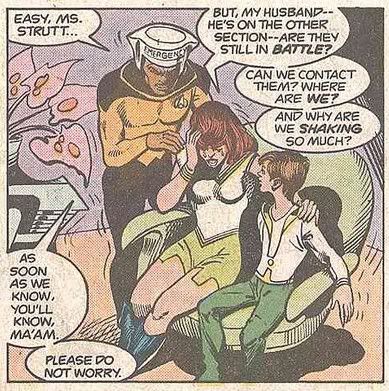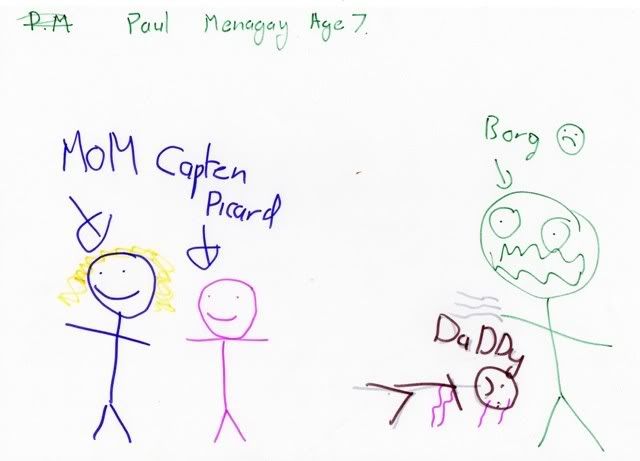-
Welcome! The TrekBBS is the number one place to chat about Star Trek with like-minded fans.
If you are not already a member then please register an account and join in the discussion!
You are using an out of date browser. It may not display this or other websites correctly.
You should upgrade or use an alternative browser.
You should upgrade or use an alternative browser.
Families on ships
- Thread starter asdf1
- Start date
The whole families on ships kinda bugged me, i always thought it was a horrible idea to send a ship into battle with a load of kids on board. However i believe in an exception aboard stations, anyone else think this?
Saucer separ.
If the American wagon trains hadn't ventured forth across the west with families on board, would American have been settled the same way? Who would have gone? Only single men?
How do children get to space stations if they can't travel by starship?
The whole families on ships kinda bugged me, i always thought it was a horrible idea to send a ship into battle with a load of kids on board. However i believe in an exception aboard stations, anyone else think this?
It made sense within the original premise of TNG but since that premise was never carried forward beyond the first episode... not so much...
The whole families on ships kinda bugged me, i always thought it was a horrible idea to send a ship into battle with a load of kids on board. However i believe in an exception aboard stations, anyone else think this?
Saucer separ.
If the American wagon trains hadn't ventured forth across the west with families on board, would American have been settled the same way? Who would have gone? Only single men?
But the Enterprise-D never fulfilled that sort of mission, virtually all of their time was spent dealing with know races in known space. It was just poorly handled generally. Did we ever have a kid die during an attack? or are suppose to believe that crewman bighat got all the kids to safety during every attack?

^^^^^
Agreed. The way it ended up being portrayed on TNG was pretty nonsensical.
However, go pick-up The Buried Age by Christopher Bennet. The way he describes the Galaxy class set-up and mission in that novel makes perfect sense, and is kind of cool.
It's a great book and works fine within that book.
Taking your kids to a new home is not quite the same as packing them up and having them join you aboard an aircraft carrier.The whole families on ships kinda bugged me, i always thought it was a horrible idea to send a ship into battle with a load of kids on board. However i believe in an exception aboard stations, anyone else think this?
Saucer separ.
If the American wagon trains hadn't ventured forth across the west with families on board, would American have been settled the same way? Who would have gone? Only single men?
Children today get to Disneyland from Maryland by passenger plane. They don't ride in a B52.How do children get to space stations if they can't travel by starship?
Starfleet ships have a wide range of functions -- including policing the galaxy, responding to catastrophes and confronting enemies. Kids don't belong on board.
You have to wonder what sort of psychological problems that the kids on-board developed.
Woken in the middle of the night on a regular basis by alarms and the computer screaming "Warp core breach in progress".
Skipping to school and watching a part of the ship being pulled out and crewmen sucked to their deaths.
Being phased, gassed or knocked out by the alien of the week.
Having nightmares because they are unable to sleep for days on end.
Etc etc..
I bet they all developed twitches and coke habits.
Woken in the middle of the night on a regular basis by alarms and the computer screaming "Warp core breach in progress".
Skipping to school and watching a part of the ship being pulled out and crewmen sucked to their deaths.
Being phased, gassed or knocked out by the alien of the week.
Having nightmares because they are unable to sleep for days on end.
Etc etc..
I bet they all developed twitches and coke habits.
...OTOH, 24th century child psychologists might condemn their 20th century counterparts to deepest hell for allowing children to be raised in a stimulus-free environment where they don't learn to cope with anything much.
It's not as if the 24th century people think of their kids (or women) as worth special protection to begin with. They're not quite labor, the way they were in the bygone millennia - but they are not quite the precious investments they became with the rise of the bourgeoisie, either. In many ways, the 24th century seems to be back to the idea of kids as tiny adults, not merely capable of tagging along with their parents but deserving of that privilege as well.
Timo Saloniemi
It's not as if the 24th century people think of their kids (or women) as worth special protection to begin with. They're not quite labor, the way they were in the bygone millennia - but they are not quite the precious investments they became with the rise of the bourgeoisie, either. In many ways, the 24th century seems to be back to the idea of kids as tiny adults, not merely capable of tagging along with their parents but deserving of that privilege as well.
Timo Saloniemi
Well you also have to remember they weren't intended to be warships.
I think that Trek's way of dealing with things is that parents in that universe don't raise their kids under a glass bell.
As a result, they'd be far more capable of dealing with whatever life throws at them better than contemporary kids.
Here's some kids learning about "how to deal with what life throws at them":
http://www.youtube.com/watch?v=D-FDeT1HwAE
Whole families get wiped off of Federation colonies all the time.
Aside from the Galaxy-class and the Saratoga, have there been any other indications of families on board ships?
The Enterprise could be explained by justifying that it is designed for long term missions. Asking families to spend several years apart could be an undue hardship. If they felt that it was worth the risk, then I could see where Starfleet would allow it.
As for the Saratoga, it's possible that the ship was merely designed to patrol the relatively secure spacelanes of the Federation, and that the Borg attack was a highly unusual happening.
Aside from the Galaxy-class and the Saratoga, have there been any other indications of families on board ships?
The Enterprise could be explained by justifying that it is designed for long term missions. Asking families to spend several years apart could be an undue hardship. If they felt that it was worth the risk, then I could see where Starfleet would allow it.
As for the Saratoga, it's possible that the ship was merely designed to patrol the relatively secure spacelanes of the Federation, and that the Borg attack was a highly unusual happening.
Whole families get wiped off of Federation colonies all the time.
That happens considerably less often than does the destruction of Federation starships. No one's arguing that any place is 100% safe -- but there is a such thing as significantly increasing the danger to a child that he or she will die.
Aside from the Galaxy-class and the Saratoga, have there been any other indications of families on board ships?
Canonically, no. The USS Titan in the Star Trek: Titan novel series has some children aboard, though.
The Enterprise could be explained by justifying that it is designed for long term missions. Asking families to spend several years apart could be an undue hardship.
Then the officers should request a transfer off the Enterprise. Children should not be taken aboard a military starship, where life is significantly more dangerous than it is on a Federation planet in Federation space.
No. of Galaxy-class starships lost in action: 3 (and the Odyssey off-loaded all of their non-essential personnel) + Saratoga.
No. of colonies destroyed during Star Trek's run? I don't have time to count them all.
Starfleet is not, in the strictest sense of the word, a military organization. If the officers in question felt that it was worth it, then that's their call to make.
No. of colonies destroyed during Star Trek's run? I don't have time to count them all.
Starfleet is not, in the strictest sense of the word, a military organization. If the officers in question felt that it was worth it, then that's their call to make.
No. of Galaxy-class starships lost in action: 3 (and the Odyssey off-loaded all of their non-essential personnel) + Saratoga.
We saw starships being destroyed all the time in TNG and pre-Dominion War DS9.
No. of colonies destroyed during Star Trek's run? I don't have time to count them all.
I can think of exactly two from TNG -- the one the Borg destroyed in "The Best of Both Worlds, Part I" and the one the Cystalline Entity destroyed in that episode where they killed it. I cannot recall how many Federation colonies were established to have been destroyed by the Borg in "The Neutral Zone."
Starfleet is not, in the strictest sense of the word, a military organization.
It is the organization established by and obediant to the state (numerous references to the "Federation Starfleet") that is legally empowered to use force to protect the state ("A Call to Arms" [DS9], "The Best of Both Worlds, Parts I & II" [TNG]) and that is legally obligated to obey the state ("Paradise Lost" [DS9]); it also has courts-martial ("The Menagerie, Parts I & II," "Court Martial" [TOS]) and is the organization tasked with enforcing martial law when martial law has been declared ("Homefront" [DS9]). It is referred to as the military by Dr. David Marcus in Star Trek II: The Wrath of Khan, its theoretically taking over the Federation government is referred to as a military dictatorship in "Paradise Lost" (DS9), Nog refers to himself and to the cadets of Red Squad as "soldiers" in "Valiant" (DS9), and Kirk refers to himself as a soldier in "Errand of Mercy" (TOS).
Whilst it is clear that the Federation Starfleet is not as jingoistic as many present-day military organizations and that is missions include diplomacy, exploration, and humanitarian reflief, none of that precludes the Federation Starfleet from fitting the legal definition of a military organization.
If the officers in question felt that it was worth it, then that's their call to make.
That's a bit like saying that if a parent feels it's worth it to stand a child in the middle of a busy highway that it's their call to make.
While Starfleet may have military facets, it's primary function is not military but exploratory. I think that's been pretty well stated numerous times in canon.
What I took Sci to mean is not necessarily that it's only military, but the ships certainly deal with military situations regularly enough to warrant a generalization.
What I took Sci to mean is not necessarily that it's only military, but the ships certainly deal with military situations regularly enough to warrant a generalization.
We saw starships being destroyed all the time in TNG and pre-Dominion War DS9.
But how many of those starships carried families? It has been established in canon, that it was a fairly unusual practice outside of the Galaxy class.
Similar threads
- Replies
- 45
- Views
- 6K
- Replies
- 1
- Views
- 2K
If you are not already a member then please register an account and join in the discussion!

